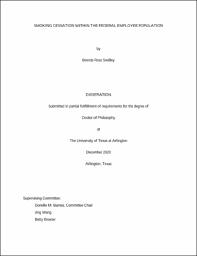
ATTENTION: The works hosted here are being migrated to a new repository that will consolidate resources, improve discoverability, and better show UTA's research impact on the global community. We will update authors as the migration progresses. Please see MavMatrix for more information.
Show simple item record
| dc.contributor.advisor | Barnes, Donelle M | |
| dc.creator | Swilley, Brenda Ross | |
| dc.date.accessioned | 2020-12-22T20:40:12Z | |
| dc.date.available | 2020-12-22T20:40:12Z | |
| dc.date.created | 2020-12 | |
| dc.date.issued | 2020-11-16 | |
| dc.date.submitted | December 2020 | |
| dc.identifier.uri | http://hdl.handle.net/10106/29647 | |
| dc.description.abstract | This article-based dissertation consists of two complete manuscripts related to smoking cessation within the federal employee population. In the first manuscript, the self-determination theory was described and evaluated using Walker and Avant’s criteria. A demonstration of how the theory has been used in previous research, as well as the application of the theory to federal employees who smoke was also presented in the article. There was no theoretical framework for administrators or clinicians to use when developing, implementing, or evaluating smoking cessation. Manuscript one addresses the need for a theoretical framework. As theory creates the foundations of nursing practice, occupational health nurses and researchers can use their clinical and research skills to explain and confirm theoretical propositions to advance health outcomes of employee populations.
Manuscript two was a data-based retrospective study of federal employees’ outcomes following a smoking cessation intervention. Administrators working in Federal Occupational Health (FOH), collected smoking cessation data on employees who participated in the intervention between 2009-2019, without analysis of the data. The study findings represent the first analysis of the data that described the sample population and factors associated with smoking cessation within this population. Comprehensive smoking cessation interventions are effective when employees are aware that they exist. FOH’s smoking cessation intervention helped federal employees quit smoking. Program administrators can do a better job at collaborating with other federal administrators to ensure that federal employees have easy access to evidence-based smoking cessation interventions, FDA-approved cessation medications, and behavioral counseling. The outcomes of the research may help promote future tobacco cessation interventions at the worksite and increase quit rates within this employee population.
The dissertation concludes with additional limitations of study two, implications for nursing practice, and future research. Worksite tobacco cessation interventions may increase federal employees smoking quit rates and ultimately lead to better health outcomes within this population. | |
| dc.format.mimetype | application/pdf | |
| dc.language.iso | en_US | |
| dc.subject | Self-determination theory | |
| dc.subject | Health promotion | |
| dc.subject | Smoking cessation | |
| dc.subject | Federal employee smoking cessation intervention | |
| dc.subject | Tobacco cessation program | |
| dc.title | SMOKING CESSATION WITHIN THE FEDERAL EMPLOYEE POPULATION | |
| dc.type | Thesis | |
| dc.degree.department | Nursing | |
| dc.degree.name | Doctor of Philosophy in Nursing | |
| dc.date.updated | 2020-12-22T20:40:12Z | |
| thesis.degree.department | Nursing | |
| thesis.degree.grantor | The University of Texas at Arlington | |
| thesis.degree.level | Doctoral | |
| thesis.degree.name | Doctor of Philosophy in Nursing | |
| dc.type.material | text | |
| dc.creator.orcid | 0000-0002-4392-5930 | |
Files in this item
- Name:
- SWILLEY-DISSERTATION-2020.pdf
- Size:
- 2.992Mb
- Format:
- PDF
This item appears in the following Collection(s)
Show simple item record


